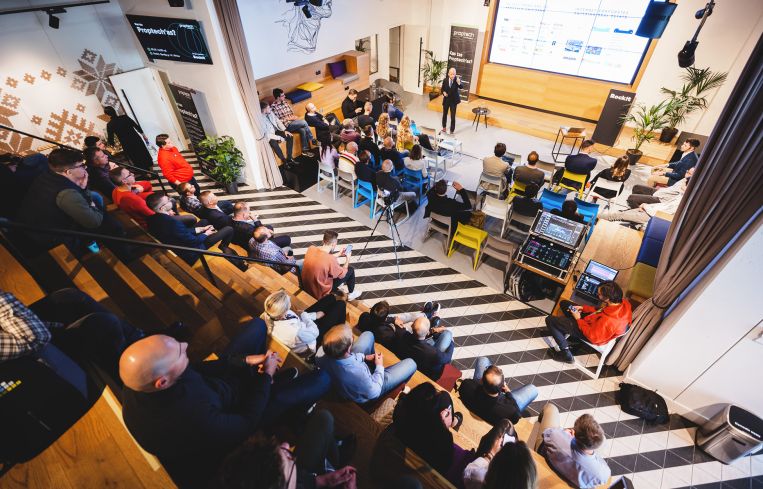Lithuania Proptech Grows Behind Rich Real Estate Ecosystem
A focus on education and high housing standards, plus smart government support, propel the small Baltic nation’s built world innovation scene
By Philip Russo July 22, 2025 7:30 am
reprints
Among smaller nations that punch above their weight in proptech, Lithuania is a real contender when it comes to real estate innovation.
Similar to its fellow Baltic state Estonia, the nation of 2.9 million people is making its mark in proptech thanks to a quality public educational system; governmental and culturally driven high standards and expectations for its housing industry; and a nonprofit and corporate support system.
The cultural aspect of Lithuania’s proptech growth stems in large part from its declaration of independence from the former Soviet Union in 1990, said Beatrice Laurinkute Kijeviciene, CEO at Strato Create, a software as a service (SaaS) platform based in the capital city of Vilnius. Strato Create automates early-stage building design, cost estimation and collaboration for architects, prefab builders and manufacturers.
“The key spur is the mentality of Lithuanians following our independence,” said Kijeviciene. “We are, let’s say, hungry. We want to grow.”
That national appetite includes a strong desire for home ownership so that Lithuanian families can house a hoped-for growing population, she said. The country has one of the lowest birth rates in the Western world at 1.2 children per woman.
Beyond demographics, Lithuania’s educational system produces a lot of high-quality information technology, material engineering and programming talent. “We have a good culture of working,” Kijeviciene said. “I think all this empowers us to create more innovation, and one of the strong points is in construction.
“This combination in a small market is good for testing. We have quite a good culture of quality construction. The weather here forces us to build better houses because the winters are harsh and the humidity is high. Also, the government requires us to build plus-plus houses,” meaning a final product of stringent standards.
Having a background in media arts, Kijeviciene became a serial proptech entrepreneur after helping her former husband write a construction innovation project.
“I wrote the project for an [European Union] initiative here, and collaborated with universities, scientists and other companies to create new materials when we were creating one of the largest 3D printers in Europe,” she recalled. “It can print two materials at once, and we created geopolymer-mycelium insulation, modular houses, and now we’re working with software.”
While the Lithuanian government doesn’t directly subsidize construction and proptech startups like Strato Create, it does enforce digitalized processes for permitting and other related documents, which speeds up the pace of building, Kijeviciene said.
Other large factors in Lithuania’s construction and proptech scene include the country’s EU membership, a population full of people who speak two or more languages — usually including English — and having nonprofit organizations focused on the industry.

“I can say it’s growing rapidly,” Kijeviciene said of the proptech sector. “I’m very happy that we have this initiative of Proptech Lithuania that connects startups with established companies, corporations and the construction industry. These collaborations are real, and, as a CEO, I can say that we are meeting and getting help a lot. I think Lithuania could be another Israel, you know, like a contech scene in Europe.”
PropTech Lithuania is the predominant trade organization with the stated goal of making Lithuania a global innovation hub with the world’s most effective real estate ecosystem.
Since its inception three years ago, the organization now comprises 50 companies, including 28 proptech startups, as well as real estate firms, and legal and design agencies, said Martinas Eitmonas, president and co-founder at PropTech Lithuania. It includes firms not based in Lithuania, but otherwise connected to the country.
Among the prominent proptech members of PropTech Lithuania are Dextall, an AI-powered prefab exterior wall company; building energy efficiency company Exergio; PVCase, an end-to-end solar project development platform; and Profitus, a peer-to-peer crowdfunding real estate platform.

“Proptech is growing in Lithuania because smaller countries really have the potential to move quickly,” said Eitmonas. “We can reach any decision-maker in days, if not hours, most times. And we are bringing this proposition — not only for local founders, but also for international proptech founders — that can be a perfect catalyst for ideas to grow.
“We are doing this through lots of events and community meetups, inviting very different people, from first-day founders to the seasoned CEO, and even the shareholders of the top real estate companies in the region. They are coming together and exchanging ideas. They are often very surprised at what they can bring out of these meetings. So we worked as a very dedicated community builder and the result is clear: The community is really growing.”
Along with its own Future of Real Estate Forum — a new event dedicated to innovation, sustainability, AI and the digital transformation of the built environment to be held Nov. 11 in Vilnius — PropTech Lithuania is conducting more international initiatives. That includes bringing Lithuania startups to international stages, such as last year’s Barcelona Smart City Expo. (And, it should be noted, that international proptech firms, including Manhattan-based HqO, are in turn looking to do more business in Lithuania as part of a focus on Europe.)
Successful Lithuanian non-real estate startups such as Vinted and NordVPN are models for the country’s proptech startups, said Eitmonas, who also underlined the success of fintech and a supportive government setting for business.
“In general, Lithuania and all Baltic states, especially Estonia, are a good ground for startups,” he said. “In general, starting a company is super easy. You can start a company online, and you can do the entire process in maybe up to three days, but the main moves are done in minutes or hours. So it’s super easy and straightforward. And the entire tax system is also not super complicated. The taxes are normal in all international ratings. Lithuania is recognized as a good place to start a business.”
Eitmonas said that while some giant companies have come out of Lithuania, funding for proptech startups remains a major challenge.
“So the funding is honestly the hardest for founders in our region,” added Eitmonas. “Funding is hard to access, for sure, but it’s not impossible to access. Dextall, which you covered, is a Lithuanian and U.S. company. The founders just attracted a $15 million investment, and they are working predominantly in the U.S. market. They are members of our association and part of the community. So funding is difficult, but companies use angel investors, leverage all private connections, and also shortcuts — for example, the Plug and Play accelerator, which is working together with the Lithuanian government to accelerate some of the startups.”
Kijeviciene, who sits on the board of PropTech Lithuania, had a similar viewpoint.
“We’re currently working with architects and manufacturers in Lithuania and preparing to launch in other EU countries,” said Kijeviciene. “We’ve raised funding from CoInvest Capital, angel investors, and the U.S.-based accelerator Plug and Play.”
Philip Russo can be reached at prusso@commercialobserver.com.



